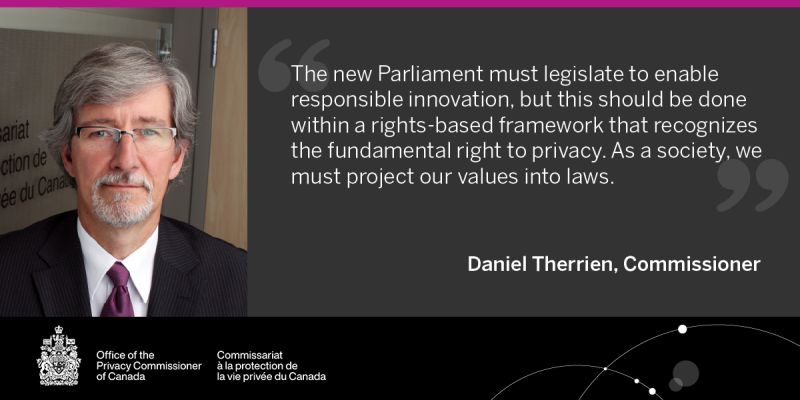December 9, 2020
Privacy Commissioner of Canada Daniel Therrien made the following statement during a press conference.
(Check against delivery)
Good morning, and thank you for joining me.
As some of you will know, my mandate as Commissioner will come to a close in June, which means this will be my final annual report to Parliament.
Since my mandate began in 2014, my office has sought to advance privacy interests by publishing guidance and policy positions – for instance on meaningful consent and online reputation – and through investigations that have identified how real are the threats to our rights, whether to democratic rights in Facebook/Cambridge Analytica, or through mass surveillance as in the Clearview matter. Our attempts generally fell short due to major flaws in our laws.
When it comes to federal privacy laws, our societal values and fundamental rights, centuries in the making, are not adequately protected. That must change – hence the title of this report: Projecting our values into laws.
There is no doubt that the modern economy depends, and will increasingly depend, on the value of data. The pandemic has shown that digital technologies can serve the public interest. Building a sustainable economy in a post-pandemic world will require the responsible use of personal data.
Reform of privacy laws is therefore urgently required, in part for economic reasons. The adoption of modern, rights-based privacy laws that reflect Canadian values and support responsible innovation would be consistent with the government’s intention in the last Speech from the Throne to grow a more resilient economy that works for everyone.
I agree with the intention behind former Bill C-11 to give organizations greater flexibility to use personal information, even without consent, if that is done for legitimate business interests.
But this should be done within a rights-based framework that recognizes the fundamental right to privacy. Greater flexibility should also come with greater corporate accountability.
What is needed is not more self-regulation but true regulation, meaning objective and knowable standards adopted democratically, enforced by democratically appointed institutions like my office that can ensure organizations are truly accountable.
Privacy protection and economic growth are not conflicting values. To the contrary, there is no sustainable growth without consumer trust, and there is no trust without the protection of rights. Countries that are innovation leaders understand this. Canada should follow suit.
A new Parliament marks an opportunity to adopt new laws fit for the 21st century. That is the message in recent letters I have written to the Prime Minister, senior ministers and party leaders in the House of Commons.
These letters outline key issues to be addressed in the design of new laws:
- enable responsible innovation;
- adopt a rights-based framework;
- increase corporate accountability;
- adopt similar principles in public and private sectors laws – given the increased reliance on public-private partnerships, as we saw for instance in the Clearview matter;
- ensure Canadian laws are interoperable, internationally and domestically;
- adopt quick and effective remedies, including giving my office the authority to make legally binding orders against offenders and to impose meaningful monetary penalties where warranted.
Canada’s privacy regime had already fallen behind the privacy laws of many of its global trading partners, and now it is falling behind domestically, as provinces are stepping in to fill gaps in federal law.
Canada’s federal Parliament should follow the lead of its three most populous provinces, who have made proposals towards responsible digital innovation within a legal framework that recognizes privacy as a fundamental human right.
Quebec’s Bill 64, adopted into law in September 2021, and Ontario’s recent white paper on privacy law reform issued in June, both set out a rights-based approach to privacy as well as expansion of the scope of their laws. A British Columbia parliamentary report published this week makes similar recommendations.
While these initiatives are excellent, they do not absolve the federal government from the responsibility to ensure all Canadians are protected in that manner.
Federal legislation that would achieve this goal would reassure citizens that they would receive similar protections throughout the country. It would also benefit commercial organizations by setting interoperable norms, reducing compliance costs and increasing competitiveness.
As a society, we must project our values into the laws that regulate the digital space. Our citizens expect nothing less from their public institutions. It is on this condition that confidence in the digital economy, damaged by numerous scandals, will return.
We welcome recent comments from the Prime Minister and Minister Champagne that are consistent with the approach we are advocating. Specifically that we need a regulatory framework that reflects Canadian values and that the benefits of participating in the digital space must not come at the expense of people’s rights.
I also welcome Minister Champagne’s recent confirmation that a federal bill will likely be tabled next year. He also indicated that this bill will address the issue of algorithms, which are at the core of artificial intelligence. These technological tools are useful, indeed they are the way of the future, but they are opaque and of critical importance when it comes to protecting privacy. Legislative reform should therefore make it a priority to authorize my office to proactively inspect these technologies, to ensure they are deployed in a manner consistent with the values and rights of Canadians.
My office looks forward to working with the government and Parliament on new privacy laws that effectively protect the privacy of Canadians.
I would be pleased to answer your questions.



